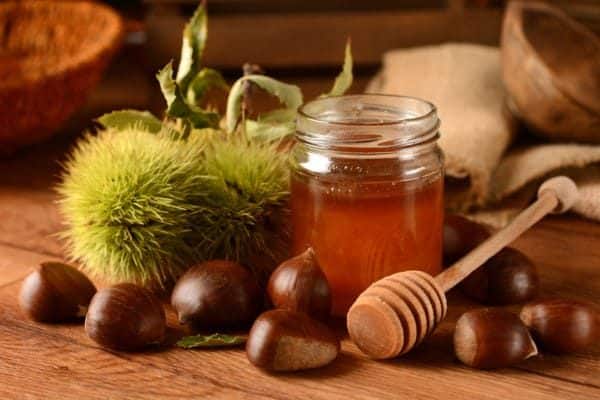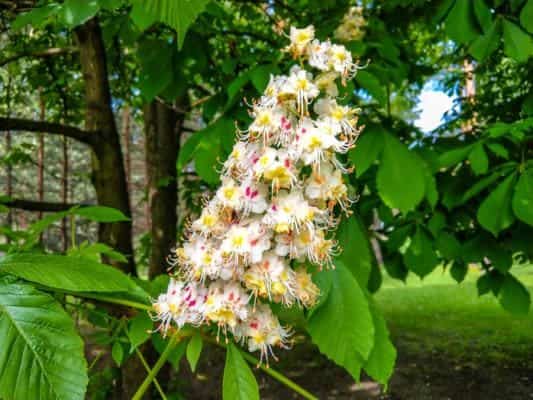If you’re a honey lover, you’ve probably heard of chestnut honey, but you might not be quite sure if it is a worthy addition to your pantry. You may wonder how it compares to regular honey or if it suits your palate. We’ve done the research for you to clear up all the confusion.
Chestnut honey is produced by bees pollinating and gathering nectar from chestnut tree blossoms. It has a unique, nutty, leathery, and slightly bitter taste. It’s usually dark brown and depending on the type of tree, weather conditions, and even the season, it will have different tastes and colors.
In the rest of the article, we’ll elaborate on this type of honey, describing its taste, color, and health benefits, and provide tips on where to get it and how much it typically costs.
What does Chestnut Honey Taste Like?
Chestnut honey has a unique, bitter taste with a hint of smoke and leather. This spicy-tasting honey has an aromatic taste, which is strong and lingers in the mouth with its faint, nutty aftertaste.

Chestnut honey is made from the nectar of chestnut flowers. If you try several jars of chestnut honey, you will realize that no two jars of chestnut honey taste and look the same. That’s because many factors determine this type of honey’s taste and appearance, including the type of chestnut, weather, and the type of bees.
For example, during a dry summer, the honey is more potent and saturated. That’s because the bees don’t have as much choice when it comes to flowers. During this season the chestnut nectar is more concentrated. The taste also slightly changes depending on the source since bees can source the nectar from blossoms and honeydew.
Chestnut honey is monofloral and has a dark brown color, which results from the tannin in the tree flowers. Interestingly, the darker it is, the stronger the smell and taste.
The sharp, bitter taste is specific to the raw, unheated honey. So, if the honey doesn’t taste bitter, it is a strong indicator that it has been heated and pasteurized.
Generally speaking, if you want to try new tastes, especially intense ones, to awaken your senses, chestnut honey is the perfect variation for you. Many people prefer chestnut honey because it’s not as sweet as other types of honey.
The nuanced, nutty taste of raw chestnut honey can be a perfect combination with aged cheese like Ricotta or Stracchino, or meat dishes. Tuscanians, drizzle this popular honey varietal over pears and Pecorino Toscano.
Given its savory taste, chestnut honey goes well with many baking recipes like cakes, tarts, or cookies as a flavoring agent.
What are the Benefits of Chestnut Honey?
Like all kinds of honey, chestnut honey has many proven health benefits. Since it’s darker than other honey types, the concentration of beneficial compounds tends to be higher.
Here are some benefits of chestnut honey:
- Boosting the Immune System and Blood Profile
- Improves Dental Health
- Assists with Eye Problems
- Antioxidant Characteristics
- Lowers Cholesterol
- Natural Wound Healer
- Natural Sweetener
1. Boosting the Immune System and the Blood Profile
Several studies have reported the effect of honey on the immune system. A one-year research project found that honey has a significant influence on the immune response of rats. It can also treat anemia by increasing the number of red blood cells. Another study found that chestnut honey effectively fights Staphylococcus aureus and Escherichia coli, two antibiotic-resistant bacteria.
2. Improves Dental Health
Honey’s antibacterial activity can help reduce dental problems like plaque and gingivitis. Honey contains calcium, fluoride, and phosphorus, which protect the teeth from erosion. Plus, it’s less harmful to the teeth than sugar and even fruit juice due to its lower sucrose levels.
3. Treats Eye Problems
Another effect of chestnut honey related to its antibacterial and antifungal properties is the treatment of eye diseases. Eye infection, conjunctivitis, and keratitis are among the eye disorders that natural honey may be able to treat.
4. Antioxidant Characteristics
Chestnut honey has higher levels of antioxidants due to its dark color. Antioxidants fight free radicals that cause cell damage. The study suggests chestnut honey can contribute to preventing many problems related to cell damage like aging, cancer, or stroke.
5. Lowers Cholesterol
Chestnut honey can improve cholesterol levels. Since high cholesterol is a significant risk factor in heart diseases, honey can prevent heart disease and stroke. At the same time, it can improve good cholesterol or HDL.
A study found that honey can lower body fat, body weight, cholesterol levels, and triglyceride levels in obese patients.
6. Natural Wound Healer
Chestnut honey can be applied to wounds to prevent and treat infections. Its antibacterial and antimicrobial properties are higher than other honey types and can help speed up healing. It also has low acidity, which creates an ideal environment for tissue generation.
7. Natural Sweetener
Natural honey, in general, is a good substitute for refined sugar in sweetening food and recipes. That’s because of its lower glucose and higher fructose content. Besides, honey has some other nutrients that table sugar doesn’t have.
Where Can I Buy Chestnut Honey, and How Much Does it Typically Cost?
You can find chestnut honey online or from local producers and specialty shops, and grocers. If you want to make sure the honey is of high quality, it’s better to get it from local producers. But since this variant isn’t widely available, you can find some reputable brands online.
Rigoni De Asiago is a famous Italian producer that offers organic, gluten-free, and kosher-certified chestnut honey. Other top-rated honey producers include Giannetti Artisans, selling unpasteurized Italian chestnut honey, and Mira Nova, which offers pure raw honey from the Caucasus region.
In order to reap the full benefits, your chestnut honey has to be raw, unfiltered, and unpasteurized. If the honey is darkened, it means it’s been overheated and lost its healthful properties.
This type of honey comes with a higher price tag in comparison to other variants because of its rarity and uniqueness. The prices depend on the kind of honey, if it’s raw or heated, the producer, and the production method.
You can find a wide range of prices from $1/ounce to more than $30/ounce. Larger containers are available at lower prices, which can be great if you’re a honey lover.
Looking for more different and interesting honey varieties? We have done a ton of research for you. If you are interested the article is called, Honey Varieties You Should Discover.
In What Locations Is Chestnut Honey Produced?
Chestnut honey is particularly famous in Italy. It’s one of the most popular types of honey served with a wide variety of foods. Italians celebrate multiple festivals that feature many chestnut products, including chestnut honey.
Nevertheless, chestnut honey is produced in many other parts of the world, including Greece, France, Japan, China, and the US.
Although there are different species of chestnut trees around the world, not all of them produce nectar. The common honey-producing species is sweet chestnut, which typically grows in Europe.
The American species is called Allegheny Chinkapin, which mostly grows in the Eastern US and produces a bitter honey with a strong overwhelming taste. In South Korea, the honey-producing chestnut tree is known as the Japanese chestnut. Chinese chestnut, sequin, and Henry Chinkapin are the species that grow in China and can produce honey.
Is Chestnut Honey Seasonal or Available All Year Round?
Chestnuts are harvested in the fall. That’s when many European countries hold all the chestnut festivals.
However, bees collect nectar from May to June. The honey is produced a little later, from mid to late summer. Because of the limited pollination time, chestnut honey isn’t available all year round. But Italian chestnut honey is now more available than before, and you can find it online at any time of year.

Does Chestnut Honey Crystallize in Winter?
Crystallization is a natural process that can happen with any kind of raw honey, and chestnut honey isn’t an exception. But given its high fructose and low glucose content, chestnut honey is highly resistant to crystallization and tends to stay liquid during the winter.
You can further slow down the crystallization process by keeping the honey at room temperature.
When the honey does crystallize, its health benefits won’t be affected. All you need to do is place the jar in warm water, and the honey will return to a liquid state.
The Wrap Up
Chestnut honey is a unique-tasting honey varietal honey with a slightly bitter aftertaste. It’s produced from the nectars of chestnut tree blossoms, mostly in Europe and especially in Italy. Its strong, leathery, and bitter taste make it a unique varietal with a lingering aftertaste.
If you have a timid palate, this type of honey is definitely not for you. However it’s lack of sweetness makes it a perfect companion in baked foods, cheese, and coffee.
Due to its darker color, chestnut honey is rich in antioxidants and antibacterial agents. It can help reduce cholesterol, heal wounds, boost the immune system, and treat eye diseases.
Maybe you’re like us and enjoy tasting honey from different origins and regions or maybe you’re just realizing that there is more to honey than what you see on the supermarket shelves.
We have done the research for you on a whole range of varieties of honey for you. Below is a list of different types of honey from different floral origins and regions. If you are interested check them out, Honey Varieties You Should Discover.
Sources
● https://boroughmarket.org.uk/articles/chestnut-honey
● https://healthywithhoney.com/sweet-chestnut-honey/
● https://www.honeytraveler.com/single-flower-honey/chestnut-honey/
● https://chestnuthoney.com/10-miracle-benefits-of-chestnut-honey/
